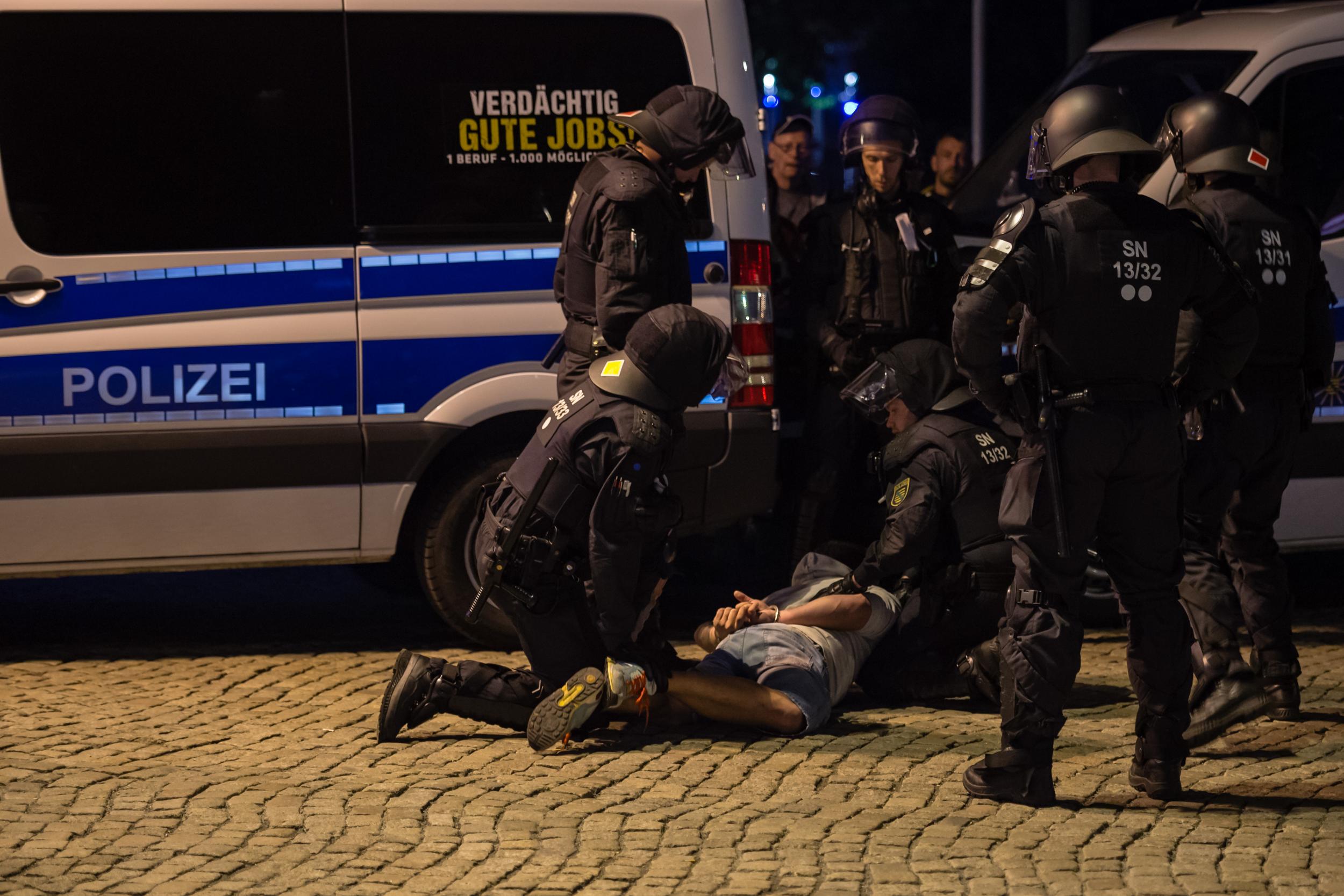Chemnitz: Nine people injured after far-right protesters clash with police in Germany
‘If once again people are parading today in the streets making Nazi salutes, our past history forces us to resolutely defend democracy,’ says foreign minister

Your support helps us to tell the story
From reproductive rights to climate change to Big Tech, The Independent is on the ground when the story is developing. Whether it's investigating the financials of Elon Musk's pro-Trump PAC or producing our latest documentary, 'The A Word', which shines a light on the American women fighting for reproductive rights, we know how important it is to parse out the facts from the messaging.
At such a critical moment in US history, we need reporters on the ground. Your donation allows us to keep sending journalists to speak to both sides of the story.
The Independent is trusted by Americans across the entire political spectrum. And unlike many other quality news outlets, we choose not to lock Americans out of our reporting and analysis with paywalls. We believe quality journalism should be available to everyone, paid for by those who can afford it.
Your support makes all the difference.At least nine people were injured as far-right protesters clashed with police in the eastern German city of Chemnitz, where tensions have risen since an Iraqi and Syrian were arrested over a fatal stabbing.
The protests on Saturday attracted around 4,500 far-right supporters from different movements including the far-right, anti-immigration Alternative for Germany party (AFD) and the anti-Islam Pegida movement, according to police estimates.
Far-right protesters marched with large portraits of victims of attacks which they claimed were perpetrated by asylum-seekers.
Some chanted “Merkel must go” and “We are the people” as they waved German flags.
The protest also drew 3,500 counter-protesters who marched in support of chancellor Angela Merkel’s decision, in 2015, to open Germany’s borders to more than a million asylum-seeking migrants.
Anti-fascist demonstrators, who were also out in force, brandished banners which read “Chemnitz is neither grey nor brown” and “Heart instead of hate”.
Berlin voiced its support for the pro-migrant rally via Foreign Minister Heiko Maas who tweeted: “The Second World War started 79 years ago. Germany caused unimaginable suffering in Europe. If once again people are parading today in the streets making Nazi salutes, our past history forces us to resolutely defend democracy.”
“We will not let right-wing extremists destroy our country and our democracy. Neither in Chemnitz nor in Saxony nor anywhere in Germany. Our constitution must prevail. We must defend it. Now!” said Green MP Cem Özdemir in a tweet which was accompanied by a picture of him with demonstrators.
Saxony state police cited security concerns as the reason for drawing an early close to the event.
The protests had a heavy police presence with reinforcements from across Germany after they were outnumbered by thousands of neonazis, football hooligans and other extremists, last week.
Street violence broke out on Sunday and Monday evenings – triggered by the arrest of one Iraqi protester and one Syrian suspected of stabbing a 35-year-old German to death. The crowds openly paid homage to Nazism and tensions boiled over into violence.
Scenes of the vigilantes chasing foreigners in the city’s streets have left people reeling across Germany. After the arrests, mobs launched random street attacks against people they perceived to be foreigners, including an Afghan, a Syrian and a Bulgarian man.
Police failed to manage to control the earlier protests and clashes at times.
The political climate in Germany has become increasingly divided in recent years – allowing the AfD to become the largest opposition party in the Bundestag.
The AfD, which has stirred controversy for its members’ attitudes to the Nazis, was originally founded as a Eurosceptic party in 2013. The far-right party won seats in parliament for the first time in September by capitalising on a surge of discontent against Ms Merkel’s immigration policy.
The AfD is now the third largest party in parliament – recasting the German political landscape and taking voters from Ms Merkel’s conservatives and the centre-left Social Democrats.
The once-fringe party has capitalised on the fact that celebrating German national identity has remained taboo since the Second World War – with standing for the national anthem and waving flags often frowned upon – by embracing an unapologetically nationalist agenda.
The arrival of migrants has triggered a fierce backlash in Germany which had led to a torrent of hate crimes. Anti-migrant sentiment has been especially strong in Saxony state.
The migrant influx has now significantly slowed down. In Germany, which recorded 745,545 asylum applications in 2016, just 93,316 were registered for the first half of this year.
Join our commenting forum
Join thought-provoking conversations, follow other Independent readers and see their replies
Comments